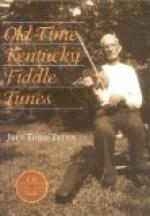“Why, that’s too bad,” said he, with ready sympathy, unfeigned and real.
All the time the girl was eying him through often-lowered lashes, and the more she looked at him the more she felt that he was not, like many “foreigners,” to be distrusted and be held aloof. His clothes did not suggest to her the “revenuer,” although they certainly were different from any she had ever seen before on man or beast (his knee breeches gave her some amusement), and he was totally unarmed, having laid his rifle down and left it at a distance, leaning against a stump.
His hands and face were not sunburned—indeed, his hands were delicately fashioned and much whiter than any she had ever seen before on man or woman. His appearance certainly did not, to her, convey the thought of strength—and manhood, there among the mountains, is thought to find its first and last expression through its muscle; yet, for some reason, although her first glance made her think he was a puny creature, she neither scorned nor pitied him. He was, perhaps, too smoothly dressed, too carefully shaved; the gun he had laid down so carelessly had too much “bright work” on it—but on the whole, she liked him. A city maiden might have well been dazzled by the really handsome chap. This simple country girl was not—but, on the whole, she liked him.
Her hand which held the spelling-book dropped, unconsciously, so that the open pages of the volume were revealed, upside down, against her knee.
“Studying your lessons?” he inquired, quite casually, good-naturedly, coming nearer.
Again her disappointment rushed upon her. Impulsively she told him of it.
“Oh,” said she, “I don’t know how! I bought me this yere book down in th’ settlement, an’ thought I’d learn things outen it. But how’m I goin’ to learn? I can’t make nothin’ out of it to get a start with.”
Instantly the pathos of this situation, not its humor, made appeal to him.
“Isn’t there a school here?” he inquired.
“Nearest school is twenty mile acrost, over on Turkey Creek,” she said briefly. “Oncet there was a nearer one, but teacher was a Hatfield, and McCoys got him, of course. This was McCoy kentry ’fore they all got so killed off. He ought to ‘a’ knowed better than come over here to teach.”
This casual reference to a famous feud—news of whose infamy had spread far, far beyond the mountains which had hatched it—from the lips of one so young and lovely (for he had long ago admitted to himself that as she stood there she was lovelier than any being he had ever seen before) appalled Frank Layson, son of level regions, graduate of Harvard, casual sportsman, amateur mountaineer, who had come to look over his patrimony and the country round about.
“Ah—yes,” said he, and frowned. And then: “It leaves you in hard luck, though, doesn’t it, if you want to learn and can’t,” said he.
“It sartin does, for—oh, I do hanker powerful to learn!”




